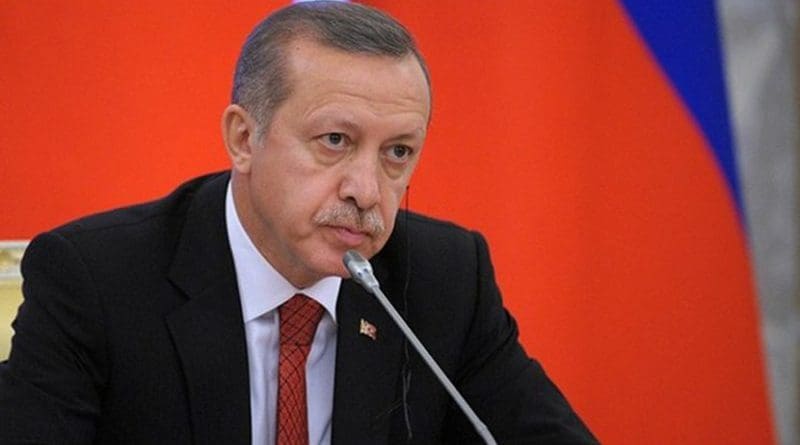Erdogan’s Mission Impossible In Syria – OpEd
The Turkish offensive in Afrin now has a new enemy: the battle-hardened pro-government Syrian forces, thus vastly complicating President Erdogan’s military triumphalism.
Less then 24 hours after dismissing the Syrian official report of dispatching forces to Afrin to assist the local forces against the “Turkish aggression,” the Turkish leaders are hit with the television images of a flag-waving Syrian convoy entering Afrin, i.e., yet another clear indication of on-going Turkish miscalculations, e.g., its erroneous expectation of quick fall of Assad’s regime 7 years ago, now replicated in delusional expectation of easy win over well-armed Kurds and their allies. Concerning the latter, after a month-long campaign, Turkey’s military has admittedly “liberated” only 9 villages around Afrin, hundreds more yet to burn and occupy.
A clue to Ankara’s arrogance, its warning to Damascus not to enter Afrin enclave simply evaded the fact that it is Syrian territory and they, the invading Turks, are the unwanted ones, who should depart, the sooner the better, otherwise they will invite nothing short of a regional conflagration; in a word, this is a growing crisis on fast track, easily capable of inflicting multiple damages to Turkey’s prized relations with its neighbors.
Undeterred, Erdogan has now pledged to capture Afrin shortly, a costly endeavor with uncertain outcome, other than a humanitarian disaster befalling the civilians, many of whom are internal refugees taking refuge in Afrin. An ugly fight thus looms ahead, bound to spiral toward open confrontation between the Turkish and Syrian forces sooner or later. With this in mind, Russia’s foreign minister Sergei Lavrov has called on Turkey to start dialogue with Syrian government, echoing the sentiment of some Turkish opposition groups. A meeting of foreign ministers of Turkey, Russia, and Iran is scheduled in Kazakhstan two weeks from now, but the events on the ground may overtake diplomacy and, therefore, the sooner these powers come together and find a mutually-acceptable solution, the better.
For Russia, which has accused the US of seeking to partition Syria, this represents a delicate situation since its forces are in Syria per the invitation of the “legitimate government,” which has condemned the Turkish invasion and called on the UN Security Council to take action in defense of its territorial sovereignty. After initially acquiescing to Turkey’s incursion, Moscow is now increasingly disquieted by the patching-up between Ankara and Washington, in light of the joint statement following Secretary of State Rex Tillerson’s visit that mentioned their “strategic partnership” and “common goals” in Syria.
Indeed, the remarkable facility with which the supposed “crisis” in US-Turkey relations disappeared and gave way to an agreement on joint custody of Manbij underscores Turkey’s NATO status and its willingness to be part of a tripartite Washington-Ankara-Tel Avi axis, one that could even stretch inside Iraq in the proximate future.
For the US, cleverly moving the chess pieces in tandem, Turkey’s invasion forces Ankara to increasingly rely on Washington for support, without which a long stay inside Syria is nearly impossible. Lacking a ground force in Syria, the US cannot achieve its objectives by its token 2000 or so military personnel and nor can it count on the assertive Syrian Kurds to turn their guns against Damascus, that is simply not their agenda. This, in turn, amounts to a ‘rent a regional power’ for US’s imperial intentions, which will inevitably exact costs in terms of Turkey’s relations with Russia and Iran, not to overlook the delicate ethnic relations inside Turkey itself.
For the Syrian Kurds, on the other hand, feeling betrayed by the US, a logical option is to enter into a new agreement with Damascus and, perhaps, replicate the Iraqi Kurdish scenario — of an autonomous regional government — instead of full autonomy. This would mean that the Syrian Kurds would end their current boycott of the peace process and engage in direct political dialogue with the government of Bashar al-Assad and, simultaneously, provide fresh guarantees to the Turkish government that their enclaves will not be launching pads for the PKK fighters.
Clearly, unless Mr. Erdogan revises himself and shows diplomatic flexibility, by heeding Moscow’s call for Ankara-Damascus dialogue mentioned above, he will dig a bigger and bigger hole for himself that, at the end of the day, may come to haunt him and perhaps even dethrone him, irrespective of the current strong popular support for his perilous gambit in Syria.

